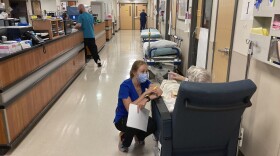-
Decisions at the federal and state levels around insurance continue to undervalue obstetrics care, providers say, with compensation models often failing to create sustainable revenue.
-
The AIDS Healthcare Foundation opened the clinic in Tacoma to provide medical and preventative care to residents dealing with HIV and AIDs.
-
The new year brings expanded paid sick leave, protections for Seattle app-based workers, more safety regulations and additional rules of the road.
-
This week, Boeing cut off company-paid healthcare coverage for tens of thousands of striking Boeing machinists and their families. But, a new Washington state law could fill the gap.
-
Myrna Broncho relies on broadband for medical care after a bad injury on her ranch. She's among millions facing a jump in costs or lost connections if the Affordable Connectivity Program expires.
-
Kaiser Permanente and thousands of its Washington workers have agreed on a tentative labor contract, averting a strike planned for Wednesday had no deal been reached.
-
Health care vans that provided COVID testing and vaccines in the pandemic are now providing a range of health services in hard-to-reach communities. New access to federal funds could expand the trend.
-
Oregon voters are being asked to decide whether the state should be the first in the nation to amend its constitution to explicitly declare that affordable health care is a fundamental human right.
-
The COVID-19 pandemic exacerbated a health care staffing shortage in Washington, so the state Legislature this year provided more than $38 million to expand nursing programs statewide.
-
COVID-19Doctors and physician assistants who spread misinformation about COVID-19 in Washington could face disciplinary measures. That’s after action taken this week by the Washington Medical Commission, which monitors and enforces licenses of about 34,000 physicians and physician assistants here.
Play Live Radio
Next Up:
0:00
0:00
Available On Air Stations








